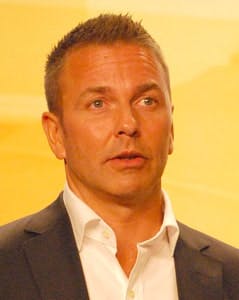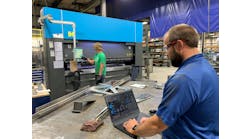Jim Montague is the Executive Editor at Control, Control Design and Industrial Networking magazines. Jim has spent the last 13 years as an editor and brings a wealth of automation and controls knowledge to the position. For the past eight years, Jim worked at Reed Business Information as News Editor for Control Engineering magazine. Jim has a BA in English from Carleton College in Northfield, Minnesota, and lives in Skokie, Illinois.
Check Out Montague's Google+ profile.
The eternal goal is still better, safer, more efficient and profitable operating decisions. And for a chemical manufacturer and a grain-handling OEM who spoke today at the GE Intelligent Platforms User Summit, the latest, fastest way to get there is cloud-based data gathering, storage and analysis using GE software, equipment and services.Two GE customers, AkzoNobel and TempuTech, described their experiences and best practices for accessing and using the cloud in their respective chemical manufacturing and grain handling applications during sequential presentations themed "Cloud Computing Becomes a Disruptive Business Tactic."
Stefan Malmsten, global industrial IT leader at AkzoNobel, reported that his company uses remote monitoring and operations to bring it even closer to its end users and customers. Its chemical manufacturing division just rolled out a manufacturing execution system (MES) to 30 remote plants in only 12 months—and relied on cloud services and GE Intelligent Platforms to do it successfully.
Even though it's more than 350 years old, AkzoNobel just finished its second year leading the Dow Jones Sustainability Index. It's also a €14.6-billion company with 49,600 employees at more than 200 production sites in 80 countries. Malmsten added that the specialty chemicals division where it's implementing cloud-enabled MES "delivers leading performance based on sustainable chemical platforms driving profitable growth in selected markets," and it also relies on social media-based networking by its personnel.
"These cloud-based tools give us numerous benefits, including reduced production and delivery expenses." AkzoNobel's Stefan Malmsten on the company's ambitious roll-out of cloud-based MES applications to 30 plants in only 12 months.
"We maintain a social manufacturing network worldwide that enables both our people and their devices to interact with each other, and we're building solutions that let them talk about important things and share best practices, especially over long distances," said Malmsten. "We started bringing people together using remote technologies in 2000. We use a lot of GE's Proficy software, so we've gained a lot of experience over that time. Now our MES and private cloud server is in Amsterdam, so it's our responsibility to take ownership of the applications we provide to our users. This is a very sound way they can all be more competitive, but they needed common language among people at different sites."Consequently, AkzoNobel worked with GE Intelligent Platforms and its Proficy software, along with solutions from Accenture and SAP, to develop its Enterprise Process Information (epi) Connected program, which also has been implemented at more than 100 customer sites. The program now includes some 2,000 global users and handles billions of daily data transactions.
"Working with an external partner, we host epi on one central server," explained Malmsten. "This is much simpler than the four or five servers per site that we used to have to handle. With two or three clicks, we can move from a chemical manufacturing plant in Canada to a paper factory in Italy. With epi, we can examine their supply, production, distribution and usage steps."
Likewise, Malmsten reported that AkzoNobel even uses epi and the cloud to help run a partially unmanned hydrogen peroxide plant in Norway from its office in Sweden about 500 kilometers away. "This plant runs 24/7, but we only have staff there on weekdays," said Malmsten. "They run and prepare operations, and then it runs unmanned on nights and weekends. It's been doing this for more than 10 years, but we can still deploy experts when needed."
Finally, because it used a global MES template for the roll-out to 30 facilities initially, AkzoNobel is planning to add another 10 sites this coming year. "These cloud-based tools give us numerous benefits, including reduced production and delivery expenses, and also lessen the costs of using our products," added Malmsten. "However, all these efforts start and stop with having the right people."
Similarly, to optimize its grain management and hazard monitoring solutions, TempuTech is embracing the cloud to improve existing operations and go after new markets, according to Adrian Merrill, operations vice president at TempuTech. Its grain management equipment includes temperature and moisture sensors to monitor stored grain and create reports, while its hazard monitoring devices capture data from conveyor systems, alerting operators about potential hazards. It also makes a variety of cabling, software and turnkey facilities for large and small grain facilities, and employs GE Intelligent Platforms' RXI PLCs.
"The challenge with previous solutions was that data was only gathered and presented daily, so it wasn't anywhere close to real time. Plus, these old methods were costly, hard to maintain and hard to access because they were only available onsite and required dedicated workstations," said Merrill. "In 2009, we were still a break-and-fix company. We needed to get real-time information to any users on their mobile devices."
As a result, TempuTech decided to implement GE's Equipment Insight software. TempuTech first tested Equipment Insight in two units at Riceland Foods' rice processing facility in Jonesboro, Arkansas. One unit had six bucket elevators and six feeder conveyors, and the other had 10 bucket elevators and 10 feeder conveyors. All together, the operations account for almost 300 sensor points. Proof of concept was performed in February 2014, and field testing was done in May 2014.
"Now we're in the third stage, which is getting our grain management even more into the cloud," added Merrill. "This includes redesigning our switchbox, incorporating GE's RXI I/O island and embedding wireless fan controls as needed. The benefits will be elimination of thousands of feet of control wire; isolation of each section of up to 30 cables; easier and faster installation; better real-time data sources; and remote alerts."
"These cloud-based solutions mean added revenue because users can determine which of thousands of bearings need grease or which belts are out of alignment before the usual alarms go off. In fact, Riceland is already talking about adding Equipment Insight at two more facilities. So we recommend not being afraid of the cloud. Just define and refine your project scope; plan for a learning curve; don't fall prey to naysayers; and educate up to management and down to operators."








